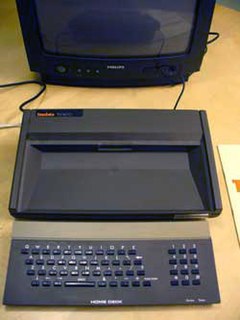Related Research Articles
The Association for Computing Machinery (ACM) is a US-based international learned society for computing. It was founded in 1947 and is the world's largest scientific and educational computing society. The ACM is a non-profit professional membership group, claiming nearly 100,000 student and professional members as of 2019. Its headquarters are in New York City.
The Esperantic Studies Foundation, abbreviatedESF is a non-profit organisation initiated in 1968 by Jonathan Pool, E. James Lieberman and Humphrey Tonkin, with the aim to further the understanding and practice of linguistic justice in a multicultural world, with a special focus on the study of interlinguistics and the role of Esperanto.
Computer-assisted language learning (CALL), British, or Computer-Aided Instruction (CAI)/Computer-Aided Language Instruction (CALI), American, is briefly defined in a seminal work by Levy as "the search for and study of applications of the computer in language teaching and learning". CALL embraces a wide range of information and communications technology applications and approaches to teaching and learning foreign languages, from the "traditional" drill-and-practice programs that characterised CALL in the 1960s and 1970s to more recent manifestations of CALL, e.g. as used in a virtual learning environment and Web-based distance learning. It also extends to the use of corpora and concordancers, interactive whiteboards, computer-mediated communication (CMC), language learning in virtual worlds, and mobile-assisted language learning (MALL).
A special interest group (SIG) is a community within a larger organization with a shared interest in advancing a specific area of knowledge, learning or technology where members cooperate to affect or to produce solutions within their particular field, and may communicate, meet, and organize conferences. The term was used in 1961 by the Association for Computing Machinery (ACM), an academic and professional computer society. SIG was later popularized on CompuServe, an early online service provider, where SIGs were a section of the service devoted to particular interests.
Computer-mediated communication (CMC) is defined as any human communication that occurs through the use of two or more electronic devices. While the term has traditionally referred to those communications that occur via computer-mediated formats, it has also been applied to other forms of text-based interaction such as text messaging. Research on CMC focuses largely on the social effects of different computer-supported communication technologies. Many recent studies involve Internet-based social networking supported by social software.
Computers and writing is a sub-field of college English studies about how computers and digital technologies affect literacy and the writing process. The range of inquiry in this field is broad including discussions on ethics when using computers in writing programs, how discourse can be produced through technologies, software development, and computer-aided literacy instruction. Some topics include hypertext theory, visual rhetoric, multimedia authoring, distance learning, digital rhetoric, usability studies, the patterns of online communities, how various media change reading and writing practices, textual conventions, and genres. Other topics examine social or critical issues in computer technology and literacy, such as the issues of the "digital divide", equitable access to computer-writing resources, and critical technological literacies.
Educational technology is the combined use of computer hardware, software, and educational theory and practice to facilitate learning. When referred to with its abbreviation, EdTech, it is often referring to the industry of companies that create educational technology.
A virtual campus or e campus, refers to the online offerings of a college or university where college work is completed either partially or wholly online, often with the assistance of the teacher, professor, or teaching assistant. Many colleges and universities now offer such courses either partially or wholly online. There are an estimated 4,500 such institutions with total enrollments approaching perhaps 2 million.

Julian Lombardi is an American inventor, author, educator, and computer scientist known for his work with socio-computational systems, scalable virtual world technologies, and in the design and deployment of deeply collaborative virtual learning environments.
Computer-supported collaborative learning (CSCL) is a pedagogical approach wherein learning takes place via social interaction using a computer or through the Internet. This kind of learning is characterized by the sharing and construction of knowledge among participants using technology as their primary means of communication or as a common resource. CSCL can be implemented in online and classroom learning environments and can take place synchronously or asynchronously.
Personalized learning, individualized instruction, personal learning environment and direct instruction all refer to efforts to tailor education to meet the different needs of students.

Larry Johnson is an American futurist, author, and educator. Currently, Johnson serves as the Founder and CEO of EdFutures.org, an international think tank, and as a Senior Fellow of the Center for Digital Education. From 2001-2016, he served as Chief Executive Officer of the New Media Consortium an international consortium of hundreds of universities, colleges, museums, research centers, and technology companies.
CALICO, The Computer Assisted Language Instruction Consortium, is a North American-based international scholarly organization, founded in 1983, dedicated to research and development in the use of computer technology in second/foreign language learning and teaching. CALICO has developed alongside the field of CALL or Computer Assisted Language Learning, and includes language educators, educational technology professionals, language technology consultants and language center directors, software designers and developers, and second language acquisition researchers, as well as graduate students in these fields. CALICO special interest groups, which reflect the changing nature of the field, currently include computer-mediated communication, gaming, graduate students, intelligent CALL, language teaching and learning technologies, second language acquisition and technology, teacher education, and virtual worlds.
Virtual worlds are playing an increasingly important role in education, especially in language learning. By March 2007 it was estimated that over 200 universities or academic institutions were involved in Second Life. Joe Miller, Linden Lab Vice President of Platform and Technology Development, claimed in 2009 that "Language learning is the most common education-based activity in Second Life". Many mainstream language institutes and private language schools are now using 3D virtual environments to support language learning.

A virtual learning environment (VLE) is a system that creates an environment designed to facilitate teachers' management of educational courses for their students, especially a system using computer hardware and software, which involves distance learning. In North America, a virtual learning environment is often referred to as a "learning management system" (LMS).
The European Association for Research on Learning and Instruction (EARLI) was founded at Leuven University (Belgium) in 1985 to support research in the field of learning and instruction. The association's main activities include a Biennial, international Conference, support of research groups such as SIGs, E-CER and EFGs and journal outlets for educational researchers in Europe. This non-profit membership association has about 2,500 members from over 60 different countries, both European and beyond. The five best represented countries within EARLI's membership are Germany, The Netherlands, United Kingdom, United States and Finland.
Frank Otto was an American educator, pioneer in computer-assisted language learning (CALL), entrepreneur, and the founding executive director of CALICO.

Anthony G. Picciano is an American scholar, author, and academic who has made significant contributions to the study of digital technology in education leadership, planning, and instruction. He has conducted major national studies with Jeff Seaman on instructional technology use in American K-12 education. He holds faculty positions at Hunter College, the Graduate Center, and the School of Professional Studies, all at the City University of New York.
Virtual exchange is an instructional approach or practice for language learning. It broadly refers to the "notion of 'connecting' language learners in pedagogically structured interaction and collaboration" through computer-mediated communication for the purpose of improving their language skills, intercultural communicative competence, and digital literacies. Although it proliferated with the advance of the internet and web 2.0 technologies in the 1990s, its roots can be traced to learning networks pioneered by Célestin Freinet in 1920s and, according to Dooly, even earlier in Jardine's work with collaborative writing at the University of Glasglow at the end of the 17th to the early 18th century.
The International Association for Language Learning Technology (IALLT) was founded in 1965 as the National Association of Language Lab Directors (NALLD), created as a not-for-profit professional association to help faculty and staff directing the first language labs to ensure their development as lab directors. As language lab directors became language center directors and language hub directors, NALLD changed into IALL in 1989 and then to IALLT in 1991. IALLT's membership is quite diverse, including faculty in languages and linguistics; language center directors, faculty, and staff; (U.S.) Title VI Language Resource Center directors, faculty, and staff; professionals in educational publishing; instructional technology staff; chief information officers; senior university administrators; and independent scholars, among others. IALLT hosts a listserv (LLTI) for the exchange of information about language technology and language centers
References
- ↑ Davies G. (2004) "Aspects of technology enhanced language learning: a UK perspective". In Fitzpatrick A., An analytical survey on Information and Communications Technologies in the teaching and learning of foreign languages: state of the art, needs and perspectives, UNESCO Report. Retrieved on 30 November 2010.
- ↑ Davies G. (2000) The History of EUROCALL
- ↑ Shield L. (2006) EUROCALL goes virtual: from Granada to cyberspace: the EUROCALL Virtual Strand [ permanent dead link ], ALT Online Newsletter. Retrieved on 30 November 2010.
- ↑ "Eurocall".
- ↑ "Research-Publishing.net".
- ↑ ReCALL journal
- ↑ EUROCALL Review
- ↑ "Eurocall".
- ↑ Executive Committee
- ↑ EUROCALL/CALICO HQ in Second Life
- ↑ EUROCALL national websites
- ↑ Affiliations
- ↑ WorldCALL
- ↑ EuroCALL. "EuroCALL". www.eurocall-languages.org. Retrieved 2017-10-16.